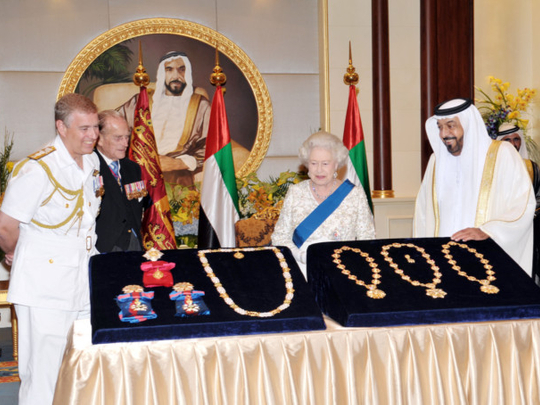
The state visit by President His Highness Shaikh Khalifa Bin Zayed Al Nahyan is the first one by the UAE to the UK in 24 years, and is a major affirmation of the importance of the close relationship between the two states and their people to the two governments.
The UK was part of the UAE’s history during the colonial era and since independence their new relationship has been based on the mutual respect due between two independent nations, which was defined by the 1971 Treaty of Friendship.
But the relationship is defined by much more than the formal treaty between the governments. Thousands of UAE nationals have chosen to make their second or third homes in Britain, as natural links of education, culture, even language and familiarity have helped make Britain an important summer base for many families.
Strong contribution
This movement of people has been both ways and more than 100,000 Britons now live in the UAE, many of whom have been here for decades. The contribution, on both sides, to the two economies is substantial and important. Bilateral trade is running at around Dh61.50 billion, which is expected to increase in the near future.
While around 4,000 British companies are present in the UAE, UAE companies have invested substantially in the UK, putting more than £5 billion (Dh28.5 billion) into the country.
These investments include Abu Dhabi National Energy Company, which has large holdings in the North Sea; Dubai Ports International, which is building and managing the London Gateway in Essex, one of the largest ports in Europe and already one of the biggest individual projects in the UK with 35,000 jobs; and Dubai Ports International Containers Station in Southampton, which is a joint venture between Dubai Ports International and Associated British Ports.
Tourism is an important part of the mutual relationship as the UAE receives more than one million British tourists every year and 30,000 UAE nationals visit the UK as tourists each year.
All this activity is now backed by a renewed political process, which has had a major effect. It has been very important that the UAE and the UK set up an institutional structure that allows their close relationship to be continuously managed at very senior levels in their two governments.
Joint efforts
In 2010, the UAE and UK set up the UK-UAE Taskforce, which is a body that meets at ministerial level several times a year, and is able to take a strategic view of the joint relationship and articulate both countries’ desire to work together better. The Taskforce was established in July 2010 by His Highness Shaikh Khalifa Bin Zayed Al Nahyan and David Cameron, British Prime Minister, to further strengthen UAE-UK relations.
The Taskforce has done a lot to repair the active management of the close relationship that which had begun to wither as the close personal ties between British and UAE officials did not keep pace with the complexity of the relationship.
Taskforce meetings cover a lot of ground. For example, the ninth and most recent meeting of the Taskforce was in London in January, when as usual the UAE delegation was headed by Dr Anwar Gargash, Minister of State for Foreign Affairs, and the UK had Alistair Burt, Minister for the Middle East.
The Taskforce welcomed the establishment of the strategic defence partnership, but moved on to discuss what was happening in the Middle East, and the two countries agreed how they could work together to improve stability in the region, and try to end the conflict in Syria and committing to coordinate closely to support political progress in Yemen and Somalia, as well as looking further afield to ongoing joint work in Afghanistan, Yemen and Pakistan.
This kind of discussion allows the two states to identify specific actions they can cooperate in, as well as being aware of the other’s activities in the same area, and offers greatly increased value to both that they do not duplicate effort and can support each other’s work.
Battling extremism
Other topics the Taskforce meeting covered included signing an agreement on prisoner transfers, under which British and UAE nationals will serve the remainder of their prison sentences in their own country. And on counter terrorism, the UK welcomed the inauguration of the UAE’s initiative in setting up the International Centre of Excellence for Countering Violent Extremism and reiterated the UK’s support for the centre’s work. The UK was also made fully aware of the UAE’s plans to hold an Anti-Piracy Conference later in the year and on working to support the international effort against piracy.
The combination of the Taskforce’s regular maintenance of the UK’s and UAE’s strategic visions, with the impact of a state visit when the heads of state and government meet to both reinforce past initiatives and lay out future direction, points to a successful basis for a good relationship lasting well into the future.













